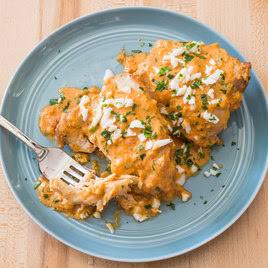Why this recipe works:
To make pollo en pepitoria that was rich but balanced, we
brightened the lush nut- and egg yolk–thickened sauce with canned
tomatoes (more consistent year-round than fresh tomatoes) and a little
lemon juice. Adding some of the braising liquid to the nut mixture when
we blended it to make the sauce helped it puree thoroughly but still
retain a pleasantly coarse consistency. Chicken thighs are fully cooked
when they reach 175 degrees, but we purposely overcook them—and do it
slowly—which allows collagen in the meat to break down into gelatin,
making the meat more tender and juicy.
less
less
Serves 4
Any dry sherry, such as fino or Manzanilla, will work in this dish. Serve with crusty bread.Ingredients
- 8 (5- to 7-ounce) bone-in chicken thighs, trimmed
- Salt and pepper
- 1 tablespoon extra-virgin olive oil
- 1 onion, chopped fine
- 3 garlic cloves, minced
- 1 bay leaf
- 1/4 teaspoon ground cinnamon
- 2/3 cup dry sherry
- 1 cup chicken broth
- 1 (14.5-ounce) can whole peeled tomatoes, drained and chopped fine
- 2 hard-cooked large eggs, peeled and yolks and whites separated
- 1/2 cup slivered blanched almonds, toasted
- Pinch saffron threads, crumbled
- 2 tablespoons chopped fresh parsley
- 1 1/2 teaspoons lemon juice
Instructions
-
1. Adjust oven rack to middle position and heat oven to 300 degrees.
2. Pat thighs dry with paper towels and season both sides of each with 1 teaspoon salt and 1/2 teaspoon pepper. Heat oil in 12-inch skillet over high heat until just smoking. Add thighs and brown on both sides, 10 to 12 minutes. Transfer thighs to large plate and pour off all but 2 teaspoons fat from skillet.
3. Return skillet to medium heat, add onion and 1/4 teaspoon salt, and cook, stirring frequently, until just softened, about 3 minutes. Add 2 teaspoons garlic, bay leaf, and cinnamon and cook until fragrant, about 1 minute. Add sherry and cook, scraping up any browned bits, until sherry starts to thicken, about 2 minutes. Stir in broth and tomatoes and bring to simmer. Return thighs to skillet, cover, transfer to oven, and cook until chicken registers 195 degrees, 45 to 50 minutes. Transfer thighs to serving platter, remove and discard skin, and cover loosely with aluminum foil to keep warm. While thighs cook, finely chop egg whites.
4. Discard bay leaf. Transfer 3/4 cup chicken cooking liquid, egg yolks, almonds, saffron, and remaining garlic to blender jar. Process until smooth, about 2 minutes, scraping down jar as needed. Return almond mixture to skillet. Add 1 tablespoon parsley and lemon juice; bring to simmer over medium heat. Simmer, whisking frequently, until thickened, 3 to 5 minutes. Season with salt and pepper to taste.
5. Pour sauce over chicken, sprinkle with remaining 1 tablespoon parsley and egg whites, and serve.
Technique
Picada: A Nutty Thickener
Unlike stews, sauces, and stir-fries that are thickened with starches or dairy, many Spanish stews and braises get their rich, hearty body from a pesto-like nut-based thickener called a picada. The basic formula, which many sources claim dates back to at least the 13th or 14th century, includes finely ground almonds or hazelnuts (picar means “to chop”) and seasonings like garlic, herbs, and spices. But many versions also contain toasted or fried bread or even hard-cooked egg yolks, as in the recipe here. The ingredients are traditionally pounded to a thick paste with a mortar and pestle (we use a blender for speed) and stirred into the pot toward the end of cooking so that it can lend body, richness, and flavor to the cooking liquid.
Almonds processed with garlic, saffron, and hard-cooked egg yolks add body and flavor to the braise.
Technique
Science: Overcook Your Chicken Thighs—and Do It Slowly
Unlike white meat, which dries out and toughens when overcooked, dark meat actually benefits from being cooked well beyond its doneness temperature (175 degrees). That’s because dark meat contains twice as much collagen as white meat, and the longer the meat cooks, the more that collagen breaks down into gelatin, which coats the meat’s protein fibers and makes it more moist and tender. (Dark meat also contains roughly twice as much fat, which coats the meat’s proteins, and has a higher pH, which helps it retain moisture more effectively.) But it’s also important to cook thighs low and slow so that they spend as much time as possible between 140 and 195 degrees—the temperature range in which collagen breaks down.
We proved the point by cooking two batches of chicken thighs to 195 degrees, one on the stovetop and one in a slower, gentler 300-degree oven. Whereas the stovetop-cooked thighs reached 195 degrees in about 25 minutes and were just moderately tender, the oven-cooked thighs lingered in that zone for nearly twice as long and were much more tender and pleasant to eat.
FORK-TENDER: For ultratender results, we slowly cook the chicken in the oven until it reaches 195 degrees.
Technique
Shopping: Sherry
What’s What?
Sherry, a wine fortified with brandy, can be confusing to buy because it comes in a wide range of styles such as dry, sweet, cream, and “cooking.” But for savory cooking purposes, stick with the dry kind. Sweet and cream sherries will taste overwhelmingly sweet when reduced in sauces, and cooking sherry, which has been treated with salt and preservatives to make it shelf-stable, can render a dish too salty.
Which Can I Use?
Dry sherries come in a variety of sub-classifications that represent degrees of aging and fortification—from drier, lighter-bodied, and less expensive fino to nuttier, heavier, and pricier oloroso. We’ve found that it’s fine to cook with an inexpensive fino, such as Taylor Dry Sherry ($5.99 for 750 milliliters), but if you want a bottle that’s as good to drink as it is to cook with, consider Lustau Palo Cortado Península Sherry ($19.99 for 750 milliliters).
COOKING ONLY
COOKING AND DRINKING





















0 comentarios:
Publicar un comentario